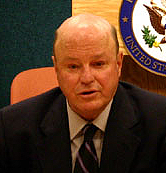Frank G. Wisner | |
|---|---|
 Wisner in 2007 | |
| Acting United States Secretary of State | |
| In office January 20, 1993 | |
| President | Bill Clinton |
| Preceded by | Arnold Kanter (acting) |
| Succeeded by | Warren Christopher |
| United States Ambassador to India | |
| In office June 9,1994 –July 12,1997 | |
| President | Bill Clinton |
| Preceded by | Thomas R. Pickering |
| Succeeded by | Richard F. Celeste |
| Under Secretary of Defense for Policy | |
| In office 1993–1994 | |
| President | Bill Clinton |
| Preceded by | Paul Wolfowitz |
| Succeeded by | Walter B. Slocombe |
| 10th Under Secretary of State for International Security Affairs | |
| In office 1992–1993 | |
| President | George H. W. Bush |
| Preceded by | Reginald Bartholomew |
| Succeeded by | Lynn Etheridge Davis |
| United States Ambassador to the Philippines | |
| In office August 16,1991 –June 10,1992 | |
| President | George H. W. Bush |
| Preceded by | Nicholas Platt |
| Succeeded by | Richard H. Solomon |
| United States Ambassador to Egypt | |
| In office August 18,1986 –June 6,1991 | |
| President | Ronald Reagan George H. W. Bush |
| Preceded by | Nicholas A. Veliotes |
| Succeeded by | Robert Pelletreau |
| United States Ambassador to Zambia | |
| In office August 2,1979 –April 19,1982 | |
| President | Jimmy Carter Ronald Reagan |
| Preceded by | Stephen Low |
| Succeeded by | Nicholas Platt |
| Personal details | |
| Born | Frank George Wisner II July 2,1938 New York City,New York,U.S. |
| Spouses | |
| Children | 4 [2] |
| Alma mater | Bachelor of Arts, Princeton University (1961) [2] |
Frank George Wisner II (born July 2, 1938) is an American businessman and former diplomat who served as United States Secretary of State following the resignation of the previous acting United States Secretary of State Arnold Kanter at noon on January 20, 1993 until the confirmation by the United States Senate and swearing in of Warren Christopher as United States Secretary of State later that day. [3] He is the son of CIA official Frank Wisner (1909–1965). On January 31, 2011, he was sent to Egypt by President Barack Obama to negotiate a resolution to the popular protests against the regime that had swept the country. [4] A White House spokesman said that Wisner had vast experience in the region as well as close relationships with many Egyptians in and out of government. The New York Times reported that he was a personal friend of former Egyptian president Hosni Mubarak. [5]
Contents
He works as an international-affairs advisor at the firm of Squire Patton Boggs in Washington, DC. [6]

